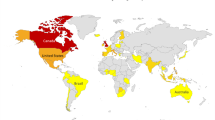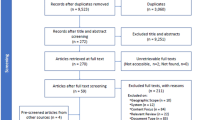Abstract
Changing climatic, demographic, and land use conditions are projected to alter the provisioning of ecosystem services in estuarine, coastal, and nearshore marine ecosystems, necessitating mitigation and adaptation policies and management. The current paradigm of research efforts occurring in parallel to, rather than in collaboration with, decision makers will be insufficient for the rapid responses required to adapt to and mitigate for projected changing conditions. Here, we suggest a different paradigm: one where research begins by engaging decision makers in the identification of priority data needs (biophysical, economic, and social). This paper uses synthesized interview data to provide insight into the varied demands for scientific research as described by decision makers working on coastal issues in Oregon, USA. The findings highlight the need to recognize (1) the differing framing of ecosystem services by decision makers versus scientists; and (2) the differing data priorities relevant to inland versus coastal decision makers. The findings further serve to highlight the need for decision makers, scientists, and funders to engage in increased communication. This research is an important first step in advancing efforts toward evidence-based decision making in Oregon and provides a template for further research across the US.



Similar content being viewed by others
Notes
Here “decision maker” refers to those individuals actively involved in designing and/or implementing legislative policy, procedures and protocols, and management programs.
References
Batker D, Swedeen P, Costanza R, de la Torre I, Boumans R, Bagstad K (2010) A new view of the Puget sound economy: the economic value of nature’s services in the Puget sound basin. Earth Economics, Tacoma
Berkes F, Folke C (2000) Linking social and ecological systems: management practices and social mechanisms for building resilience. Cambridge University Press, New York
Cantrill J, Senecah S (2001) Using the ‘sense of self-in-place’ construct in the context of environmental policy-making and landscape planning. Environ Sci Policy 4:185–203
Carr E, Worth A (2001) The use of the telephone interview for research. Nurs Times Res 6(511):511–524. doi:10.1177/136140960100600107
Chan K, Shaw M, Cameron D, Underwood E, Daily G (2006) Conservation planning for ecosystem services. PLoS Biol 4(11):2138–2152
Cheng A, Daniels S (2003) Examining the interaction between geographic scale and ways of knowing in ecosystem management: a case study of place-based collaborative planning. Forest Sci 49(6):841–854
Choi BCK, Pang T, Lin V, Puska P, Sherman G, Goddard M, Ackland M, Salinsbury P, Stachenko S, Morrison H, Clottey C (2005) Can scientists and policymakers work together? J Epidemiol Commun Health 59:632–637
Daily G, Matson P (2008) Ecosystem services: from theory to implementation. Proc Natl Acad Sci USA 105(28):9455–9456
Davis E, Moseley C, Olsen C, Abrams J, Creighton J (2013) Diversity and dynamism of fire science and user needs. J Forest 111(2):101–107
Dobbins M, Rosenbaum P, Plews N, Law M, Fysh A (2007) Information transfer: what do decision makers want and need from researchers? Implement Sci 2(20):1–12
Drake J, Kontar Y, Rife G (eds) (2014) New trends in earth-science outreach and engagement: the nature of communication., Advances in natural and technological hazards researchSpringer, New York
Francis T, Whittaker K, Shandas V, Mills AV, Graybill JK (2005) Incorporating science into the environmental policy process: a case study from Washington State. Ecol Soc 10(1):35
Gareau B (2007) Ecological values amid local interests: natural resource conservation, social differentiation, and human survival in Honduras. Rural Sociol 72(2):244–268
Granek E, Polasky S, Kappel C, Reed D, Stoms D, Koch E, Kennedy C, Wolanski E (2010) Ecosystem services as a common language for coastal ecosystem-based management. Conserv Biol 24(1):207–216
Haines-Young R, Potschin M (2011) Common international classification of ecosystem services (CICES): 2011 update. Centre for Environmental Management, University of Nottingham, Nottingham
Kareiva P, Tallis H, Ricketts T, Daily G, Polasky S (2011) Natural capital: theory and practice of mapping ecosystem services. Prog Phys Geogr 35(5):701–704
Karrer L, Beldia II P, Dennison B, Dominici A, Dutra G, English C, Gunawan T, Hastings J, Katz L, Kelty R, McField M, Nunez E, Obura D, Ortiz F, Quesada M, Sivo L, Stone G (2011) Science-to-action guidebook. Science and Knowledge Division, Conservation International, Arlington, Virginia. www.science2action.org. Accessed 9 Nov 2014
Kerkhoff L (2005) Integrated research: concepts of connections in environmental science and policy. Environ Sci Policy 8(2005):452–463
Lach D, Parker A, Boesl M (2012) Assessing regional climate needs. Pacific Northwest Climate Decision Support Consortium
Martinez R, Rusch E (2012) Understanding the connections between coastal waters and ocean ecosystem services and human health: Basic services, valuation, and resiliency (workshop). Institute of Medicine (U.S.), Roundtable on Environmental Health Sciences, Research, and Medicine, Washington
Matso K, Becker M (2014) What can funders do to better link science with decisions? Case studies of coastal communities and climate change. Environ Manag. doi:10.1007/s00267-014-0347-2
McGregor M (2006) What decision-makers want and what they have been getting. Value Health 9(3):181–185
McLeod K, Leslie H (eds) (2009) Ecosystem-based management for the oceans. Island Press, Washington
Metz D (2013) The language of conservation 2013: updated recommendations on how to communicate effectively to build support for conservation. Public Opinion Strategies, Fairbanks, Maslin, Maullin, Metz and Associates, Los Angeles
Millennium Ecosystem Assessment (2005) Ecosystems and human well-being: synthesis. Island Press, Washington
National Ocean Council (U.S.) (2014) National Ocean Policy Implementation Plan. http://www.whitehouse.gov//sites/default/files/national_ocean_policy_implementation_plan.pdf. Accessed 26 Jan 2015
National Research Council (2012) Using science as evidence in public policy. Committee on the use of social science knowledge in public policy. In: Prewitt K, Schwandt TA, Straf ML (eds) Division of behavioral and social sciences and Education, The National Academies Press, Washington, DC
National Research Council (U.S.) (2013) An ecosystem services approach to assessing the impacts of the deepwater horizon oil spill in the Gulf of Mexico. The National Academies Press, Washington
National Science and Technology Council, Subcommittee on Ocean Science and Technology (2013) Science for an ocean nation: Update of the ocean research priorities plan. Washington, DC 2502. https://www.whitehouse.gov/sites/default/files/microsites/ostp/ocean_research_plan_2013.pdf. Accessed 26 Jan 2015
Novick G (2008) Is there a bias against telephone interviews in qualitative research? Res Nurs Health 31:391–398
Oregon Department of Land Conservation and Development (1990) Principle Policies of the Oregon ORMP. http://www.oregon.gov/LCD/OCMP/Pages/Ocean_Policies.aspx. Accessed 8 Jan 2014
Pacific Coast Collaborative (2013) Pacific Coast Action Plan on Climate and Energy. http://www.pacificcoastcollaborative.org/Documents/Pacific%20Coast%20Climate%20Action%20Plan.pdf. Accessed 26 Jan 2015
Panetta L, Adams J, Claussen E, Guerrero C, Hayden M, Heal G, Kennel CF, Knowles T, Lubchenco J, Packard J, Parravano P, Pataki G, Riley J Jr., Rockerfeller D Jr., Rufe R Jr., Sullivan K, Ware M, White P (2003) America’s living oceans: charting a course for sea change (A Report to the Nation). PEW Oceans Commission
Patton M (2002) Qualitative research and evaluation methods. Qual Soc Work 1(3):261–283. doi:10.1177/1473325002001003636
Rees S, Austen M, Attrill M, Rodwell L (2013) Incorporating indirect ecosystem services into marine protected area planning and management. Int J Biodivers Sci Ecosyst Serv Manag 8(3):273–285. doi:10.1080/21513732.2012.680500
Regional Data Framework Action Coordination Team (2013) West Coast Governor’s Alliance on Ocean Health Regional Data Framework Action Coordination Team Work Plan. http://www.westcoastoceans.org/media/data_network_act/rdf_work_plan_final_3-12-13.pdf. Accessed 26 Jan 2015
Rowe A, Lee K (2012) Linking knowledge with action: and approach to philanthropic funding of science for conservation. A report to the conservation and science program. David and Lucile Packard Foundation, Los Altos
Stokstad E (2005) Taking the pulse of earth’s life-support systems. Science 308(5718):41–43
Tallis H, Polasky S (2009) Mapping and valuing ecosystem services as an approach for conservation and natural-resource management. Ann N Y Acad Sci 1162(01):265–283
Thomas D (2006) A general inductive approach for analyzing qualitative evaluation data. Am J Eval 27(237):237–246. doi:10.1177/1098214005283748
Wainger LA, King DM, Mack RN, Price EW, Maslin T (2010) Can the concept of ecosystem services be practically applied to improve natural resource management decisions? Ecol Econ 69(5):978–987. doi:10.1016/j.ecolecon.2009.12.011
West Coast Governors Alliance on Ocean Health (2013) WCGA Restructure Document. http://www.westcoastoceans.org/media/august2012excommmeeting/wcgalliance_restructure_final.pdf. Accessed 26 Jan 2015
White C, Halpem S, Kappel C (2012) Ecosystem services tradeoff analysis reveals the value of marine spatial planning for multiple ocean uses. PNAS 109(12):4696–4701
Wolf A (2004) Research strategies for policy relevance. Soc Policy J N Z 23:65–85
Worm B, Barbier E, Beaumont N, Duffy J, Folke C, Halpern B, Jackson J, Lotze H, Micheli F, Palumbi S, Sala E, Selkoe K, Stachowicz J, Watson R (2006) Impacts of biodiversity loss on ocean ecosystem services. Science 314:787–790
Zheng W, Shi H, Chen S, Zhu M (2009) Benefit and cost analysis of mariculture based on ecosystem services. Ecol Econ 68(6):1626–1632
Acknowledgments
The authors thank Oregon Sea Grant for support of this project. This manuscript has been inspired by work conducted by Michael Papenfus PhD of the US Environmental Protection Agency. His involvement and input is greatly appreciated. The authors appreciate input from Peter Ruggiero PhD and John Stevenson of the Pacific Northwest Climate Impacts Research Consortium in project development. Analysis of the interview data would not have been possible without the assistance of Max Nielsen-Pincus PhD from Portland State University, Environmental Science and Management. This manuscript resulted from the patience of the authors from differing backgrounds and disciplines and extensive and constructive comments by three anonymous reviewers.
Author information
Authors and Affiliations
Corresponding author
Appendix 1: Interview Questions Asked During Semi-Structured Interviews
Appendix 1: Interview Questions Asked During Semi-Structured Interviews
Interview biography questions:
-
1.
What is your current occupation?
-
2.
What is your background that has led you to your current position?
-
3.
How long have you worked in this field?
-
4.
What do you see as your role in policy making?
Interview substantive questions:
-
1.
What do you see as the goods, services, and other benefits that the coast and ocean provide to the community and state?
-
2.
Going forward, what are necessary policies for these coastal and estuarine goods, services, and benefits?
-
3.
How does your agency/organization play a role in policy making? And can you provide some specific example of this?
-
4.
What scientific information do you currently rely on to advocate for or push for policies that will preserve these services or benefits?
-
5.
Where do you seek information to enhance coastal policy outcomes? What information do you lack access to that might better help you in your efforts to enhance coastal outcomes? Or, can you think of tools/resources/opportunities that would be useful to obtain needed information?
-
6.
Can you discuss an instance where you have experienced barriers in working with scientists to increase the use of scientific data in policy making?
-
7.
Are there specific times when you have experienced hindrances in policy/management implementation?
-
8.
Can you explain an occasion in which you have been impacted by cross-agency barriers in policy/management implementation?
Rights and permissions
About this article
Cite this article
Goldsmith, K.A., Granek, E.F. & Lubitow, A. Information Needs Assessment for Coastal and Marine Management and Policy: Ecosystem Services Under Changing Climatic, Land Use, and Demographic Conditions. Environmental Management 56, 1502–1513 (2015). https://doi.org/10.1007/s00267-015-0576-z
Received:
Accepted:
Published:
Issue Date:
DOI: https://doi.org/10.1007/s00267-015-0576-z




